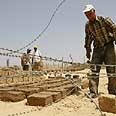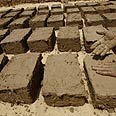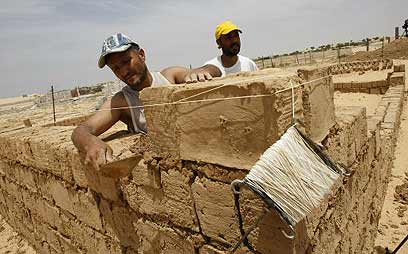

More than three months since the end of an Israeli military offensive which killed hundreds of Palestinians and destroyed or damaged thousands of homes, the people of Gaza are still waiting for the reconstruction materials they need to rebuild.
A political deal with Israel to ease its blockade of Gaza remains out of reach, blocked by the split in Palestinian ranks between hardline Hamas Islamists and Fatah moderates.
But al-Shaer says his idea is catching on. Unlike cement and steel, clay is readily available. Gazans have visited his two-room house to check it out and several said they would copy the idea and start building their own clay shelters.
"There is no alternative. Cement is not coming in and our factions are not reconciling," Shaer said, referring to the lack of progress in Palestinian unity talks, which were adjourned once again this week until mid-May, with no sign of an accord.
"People want to get married, others want to rebuild their houses. I advise people to begin building their shelters of clay and not to wait," said Shaer, who fashioned his roof out of timber and nylon sheeting.

Building with clay (Photo: AFP)
Homes of red, fired brick, tile roof and timber, of the sort common in the West and China, are rare in the Middle East and the Palestinian territories. Heavy constructions of reinforced concrete and cement block are the rule.
Shaer seemed pleased with his discovery. His brick house cost just $3,000. "It is made of clay, which means it is cool in summer and warm in winter," he said.
Tired of waiting
In the northern Gaza Strip where hundreds of houses were demolished by Israeli forces in the three-week war in January, many residents took shelter in the ruins of their concrete houses in tents donated by relief organizations.
Donor countries pledged $4 billion for the reconstruction of Gaza Strip in January but Gaza officials said the work could not begin before Israel fully opens its crossings.
There appears to be little chance of that as long as Hamas and Fatah leader Mahmoud Abbas, the Palestinian president, remain at loggerheads. The Islamists refuse to recognise Israel, while Fatah seeks a peace pact with the Jewish state and the creation of a Palestinian state alongside it.
Since the Islamists seized control of Gaza in 2007, ousting Fatah forces, Israel has completely blocked the entry of cement and steel, which it says Hamas will use for military purposes.
"There's no reconstruction. It's all a lie," said Nabil Abed Rabbo, whose 34-member family is homeless. "Everything we've heard is a lie, everyone simply made promises. We've been living for four months without shelter, without seeing reconstruction."
He said extended families which once lived communally in their three and four story concrete homes are now "displaced" and scattered, some with relatives, some in rental houses.
Aesha Abed Rabbo, 65, said she had lost 15 family members in the Israeli offensive. "Nobody is helping us, neither Arabs nor foreigners," she said. "The crossings are closed, there is no cement and no steel."
In the nearby city of Rafah, Nidal Eid helped construction workers build his own clay house out of bricks cut from clay and left to dry a couple of days in the sun. Wet clay takes the place of cement when the bricklayers go to work.
"I am building a house of two rooms, a kitchen, a salon and a bathroom. I will also build a fire-place," he said. "When I finish my place, I will start building for ten other families who've asked me to do it for them."















